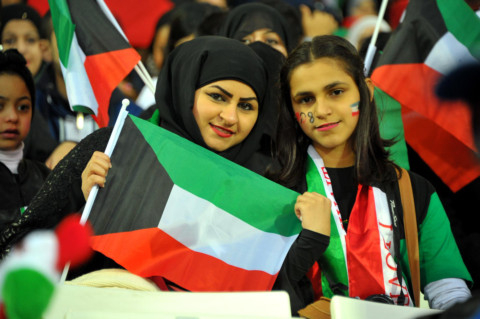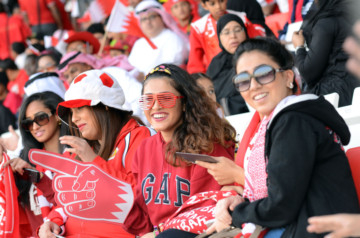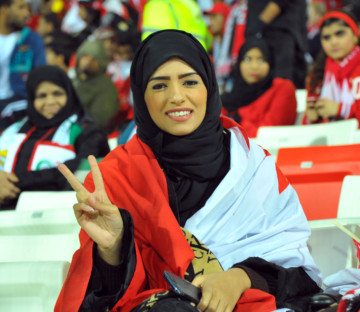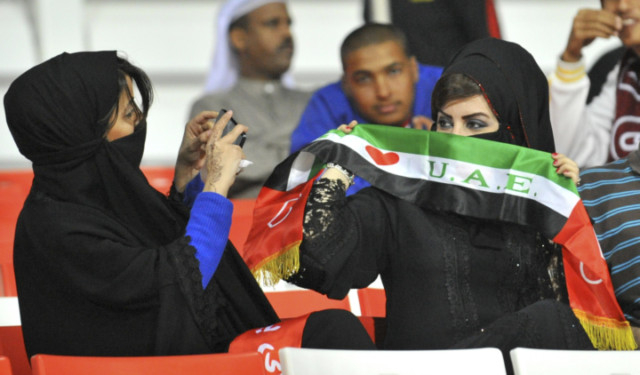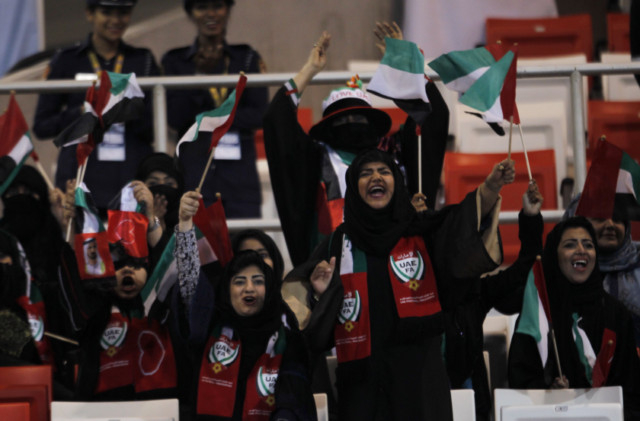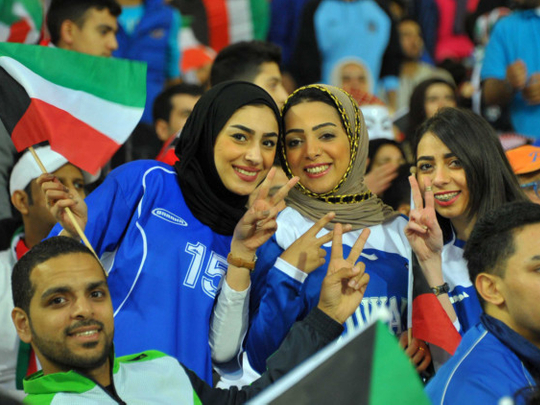
Manama: “Wow! This is more intense than the dramas we watch on TV,” Maysa told her friend as the clock ticked away on the intensely contested Gulf Cup semi-final match between the UAE and Kuwait.
The scores were level as the two teams looked for a way to settle the issue, watched by thousands of enthusiastic spectators. Extra time looked inevitable and the players seemed prepared to slug it out for another 30 minutes. Suddenly Ahmad Khalil scored what could be the most important goal in his career, sending the UAE team into the finals and forcing out a valiant Kuwait team that had previously won all three Gulf tournaments hosted by Bahrain and was hoping for an encore.
The left side of the Riffa Stadium erupted into wild cheers while the blue-dominated right side supporting Kuwait lapsed into stunned silence.
Maysa could not hold back her tears and she found herself instinctively jumping and hugging Noora, her petite friend who could not believe that their team had indeed won. Noora looked around her, still self-conscious in the sea of overjoyed human faces, unlike Maysa who did not try too hard to rein in her excitement.
It was the first time that the two office colleagues had ventured into a stadium, a place they had hitherto seen as an exclusive domain for men. But now they felt different. The year had started off on a high note with hosts Bahrain, the other Gulf states, Yemen and Iraq vying to top honours in the Gulf Cup.
The biennial event was just the opportunity for all football fans, regardless of their age, gender and beliefs, to witness the region’s best in action while enjoying hours of camaraderie and giving free vent to their patriotic spirit.
“Maysa and I made our way to the stadium after we were enchanted by the atmosphere we watched on television and felt whenever we went to the City Centre shopping complex,” Noora said. “Of course, we had serious concerns about the stadium and we were apprehensive. However, when we read the newspapers and saw the pictures of girls having genuine fun, we said that we should join the crowd and be part of the historic moment. After all, the Gulf Cup tournament is being played here and we should be among the first people to go, watch and cheer,” she said.
The two friends were among the crowd when Bahrain took on Qatar. “It was great and we won. We outplayed them and we deserved to win,” Maysa said, taking on the air of an international football connoisseur.
“We enjoyed the game and the celebrations so much that we decided to come and attend the decisive match between Kuwait and the UAE. We were no longer afraid and we saw that it was clean, harassment-free fun and we felt at ease. We have friends in Ajman and Sharjah and they wanted us to applaud their team and to tell them afterwards about the atmosphere. We do like Kuwait, mind you, but our heart this time was with the UAE. If it is not Bahrain, it should be the UAE,” Maysa said.
Hundreds of girls like Maysa and Noora made their way to the two stadiums where the matches were played.
For many, it was a defining moment in their lives where they could openly show their support for their team and for their country.
“The stigma that girls should not go to a stadium because men are at their worst behaviour there is simply not true, and the matches here in Bahrain proved it,” Naziha Mohammad, a teacher, said. “It is the people who make and convey the message, not the place. When the spectators behave well, the stadium gains a positive reputation. And in order to ensure a positive, cordial atmosphere in a stadium, you need women and girls because men, in their presence, tend to be less violent as they do not want them to get hurt,” she said.
Her friend Samira, another teacher, said that “in the lives of nations, there comes a moment when stereotypes have to be dropped and replaced by facts that people passionately construct for their own good and that of their countries.”
“In fact, I believe that the more you involve women in stadia, the more polished and peaceful they become because women are a socially appeasing factor,” she said. “I do appreciate that the masculine approach to sports and fun is different from the feminine one, but I strongly believe that, unless there is hardcore hooliganism that needs special ways to address, the presence of women helps slowly but surely create a nice and comfortable atmosphere. All that is needed by those in charge of the stadia is to ensure proper seating, clean toilets and family zones.”
Duaa, an avid Barcelona Football Club fan, said that she wanted to go to the stadium, but could not summon up enough courage.
“I have always liked football and supporting the Bahraini team live would have been a dream come true for me,” she said. “But, I found going to the stadium a daunting task and a formidable step to take because of the deep-rooted traditions. I could not even bring myself to asking my friends to count me when they talked about organising a trip to the Riffa stadium. I simply shook my head to signify I could not go.”
Would Duaa have gone to the stadium if she had been in Barcelona? “Most probably, I would have. It is a different setting and I would have felt at ease. It is all in the mind, I guess. I am sure that the Gulf Cup in Bahrain has set a trend and that presence of women in stadia will become gradually and inexorably normal, like it is in Europe where it is estimated that one quarter of all the spectators are women,” she said.


